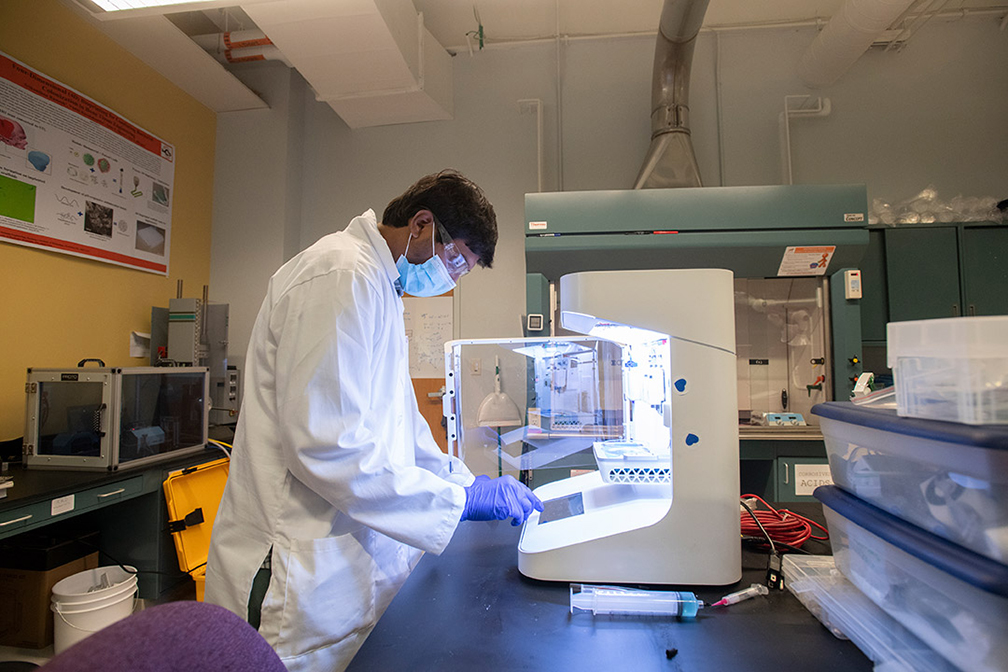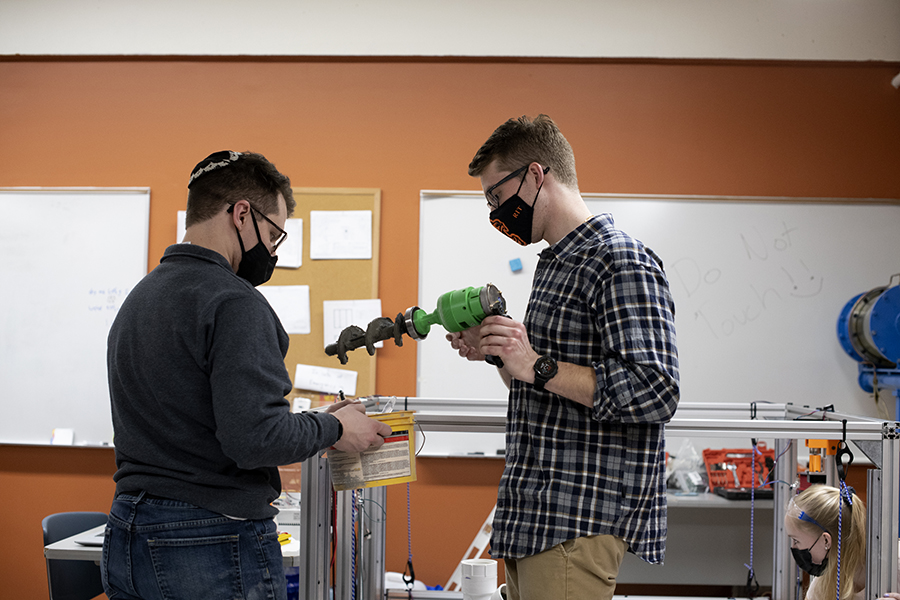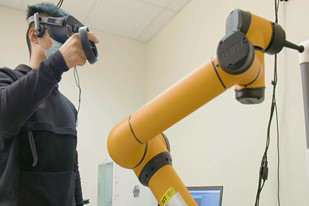Mechanical and Industrial Engineering Doctor of Philosophy (Ph.D.) Degree
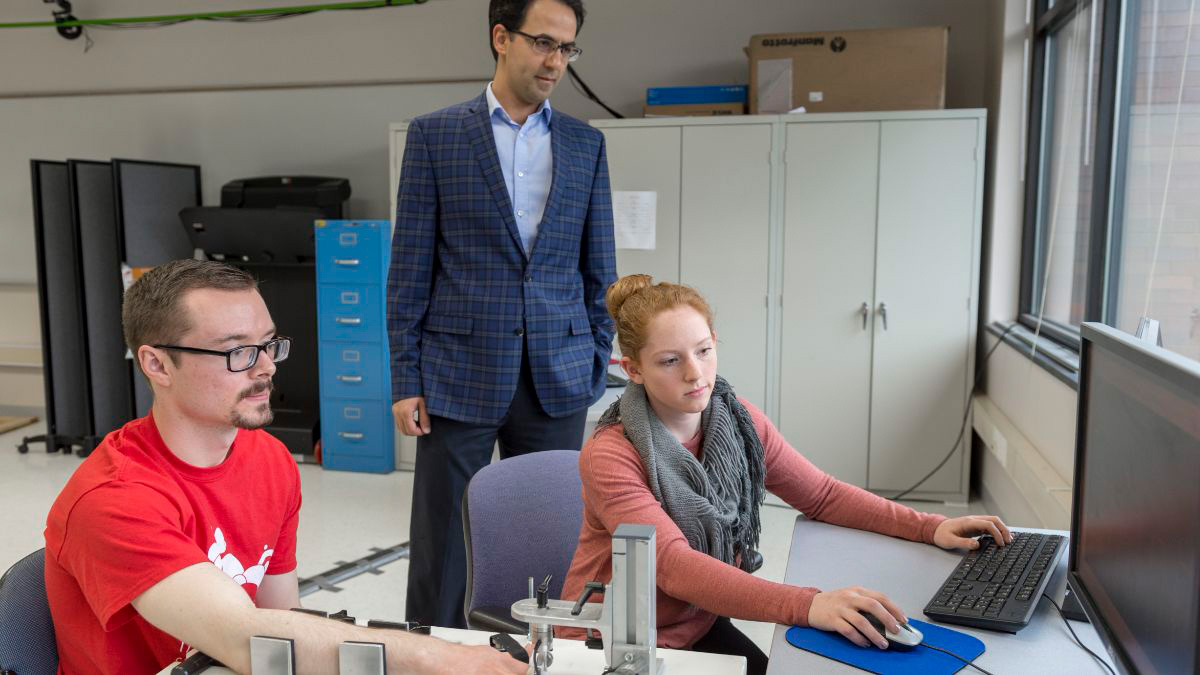
Mechanical and Industrial Engineering
Doctor of Philosophy (Ph.D.) Degree
- RIT /
- College of Engineering /
- Academics /
- Mechanical and Industrial Engineering Ph.D.
With RIT’s mechanical and industrial engineering Ph.D., you’ll gain knowledge in mechanical and industrial engineering while engaging in cutting-edge research.
Overview for Mechanical and Industrial Engineering Ph.D.
Why Pursue a Mechanical and Industrial Engineering Ph.D. at RIT?
STEM-OPT Visa Eligible: The STEM Optional Practical Training (OPT) program allows full-time, on-campus international students on an F-1 student visa to stay and work in the U.S. for up to three years after graduation.
AWARE-AI Research Opportunity: Provides hands-on experience in responsible AI research, guided by expert faculty, and enhanced by career-focused mentorship and development opportunities.
Future-Focused Curriculum: Provides a dynamic program designed by academic and industry leaders to integrate formal education with state-of-the-art research and best practices from industry.
Top-Notch Faculty: Work side-by-side with experienced faculty conducting research on contemporary problems.
The mechanical and industrial engineering doctoral program produces graduates with a depth of knowledge in mechanical or industrial engineering while allowing students to engage in cutting-edge, cross-disciplinary research. The flexible mechanical and industrial engineering curriculum encourages students to gain domain-specific knowledge from courses offered throughout the college’s portfolio of engineering programs. The curriculum, coupled with the depth of knowledge in mechanical or industrial engineering disciplines, creates graduates who are ready to tackle the world’s most pressing societal and industrial challenges. The Ph.D. in mechanical and industrial engineering develops world-class researchers who can capitalize on the most promising discoveries and innovations to develop interdisciplinary solutions for real-world challenges.
The mechanical and industrial engineering Ph.D. requires students to address fundamental technical problems of national and global importance for the 21st century. The Ph.D. in mechanical and industrial engineering finds its roots in tackling global problems in energy, transportation, health care, communications, and manufacturing. The mechanical and industrial engineering departments offer a broad range of technological research strengths including additive and advanced manufacturing, nanotechnology, robotics and mechatronics, heat transfer and thermo-fluids, simulation, modeling and optimization, ergonomics, biomimetic systems, wearable sensors, health care data analytics, prognostics and fault detection, and energy systems. Students collaborate with faculty advisors to build on these technological strengths to solve problems of global significance in order to prepare them for careers in both industry and academia.
-
Join us for Fall 2026
Many programs accept applications on a rolling, space-available basis.
-
Meet us on-campus on February 19
Learn about the programs that interest you. Hear from program faculty, speak with current graduate students, and ask the questions that will help you get one step closer to your career goals.
Research
Visit the research profiles on the industrial and systems engineering department and mechanical engineering department websites for an overview of research opportunities and to learn about our faculty members as well as research advisors in the program. For assistance in identifying faculty working in your intended area of research, please contact the program director.
AWARE-AI NSF Research Traineeship Program
The AWARE-AI National Science Foundation Research Traineeship Program provides a unique opportunity to RIT's graduate students, who are poised to become future research leaders in developing responsible, human-aware AI technologies.
Students in the mechanical and industrial engineering doctorate program are eligible to apply for traineeships in the AWARE-AI NSF Research Traineeship (NRT) Program. Trainees experience convergent AI research guided by accomplished RIT faculty who work in cross-disciplinary research tracks. In addition to high-touch mentoring, students also engage in curated, career-advancement activities. Learn more about the benefits of the trainee program, including training opportunities, application requirements, and deadlines.
Research Assistantships
Research assistantships are available to doctoral students. Learn more about the college's research assistantship opportunities and how you can apply.
Featured Work and Profiles
-
3D Printing Metal Implants Drop by Drop
Valeria Marin-Montealegre Recent advances in additive manufacturing of biometals—such as iron, magnesium, zinc, and their alloys—have opened new possibilities for patient-specific implants and bone plate systems.
Read More about 3D Printing Metal Implants Drop by Drop -
The Future of Lightweight Structures: Molten Metal 3D Printing Unlocks New Possibilities for Lattice Design
Paarth Mehta Lattice structures address a niche in the manufacturing industry due to their lightweight nature, energy absorption capabilities, high strength-to-weight ratio, and improved thermal management. These...
Read More about The Future of Lightweight Structures: Molten Metal 3D Printing Unlocks New Possibilities for Lattice Design -
Interplay of Interfacial Adhesion and Mechanical Degradation in Anode-free Solid-state Batteries
Imtiaz Ahmed Shozib Batteries play a critical role in powering modern life—from smartphones and laptops to electric vehicles and renewable energy systems. However, traditional lithium-ion batteries are approaching their...
Read More about Interplay of Interfacial Adhesion and Mechanical Degradation in Anode-free Solid-state Batteries -
What is the best way to develop products ? It depends…
Hrushikesh Godbole Mechanical and Industrial Engineering Ph.D. student Hrushikesh Godbole is rethinking how we teach engineering capstone design courses by customizing the process for every student project. His research...
Read More about What is the best way to develop products ? It depends… -
Predicting the Tensile Strength of Fiber Reinforced Composites
Dumbari David Kabari Researchers at the Fiber Composite Reliability Lab (FCRL) are using the Global Load Sharing (GLS) model and Monte Carlo simulations to accurately predict the mechanical properties and understand the...
Read More about Predicting the Tensile Strength of Fiber Reinforced Composites -
Analyzing Passive Cooling Method to Enhance Heat Dissipation for Data Centers with Computational Modeling
Divyprakash Pal Ph.D. student, Divyprakash Pal, has carried out numerical simulation studies using Ansys Fluent as a tool to analyze passive cooling methods to enhance heat dissipation for data centers.
Read More about Analyzing Passive Cooling Method to Enhance Heat Dissipation for Data Centers with Computational Modeling
Related News
-
December 19, 2025
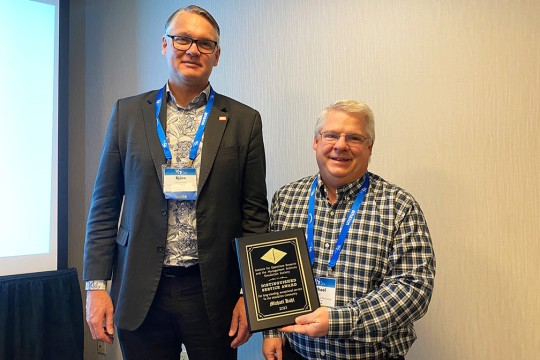
RIT engineering professor is recognized for service to the simulation community
Michael Kuhl was recognized for his distinguished work over his 25+ year career including service as I-Sim president; WSC Board of Directors; WSC program chair, proceedings editor and mobile app chair, among others.
-
November 13, 2024

Ph.D. student finds joy in carbon composite 3D printing
Sai Sri Nidhi Munaganuru, from Hyderabad, India, anticipates completing her Ph.D. this summer from RIT’s mechanical and industrial engineering program. Her work extends the capability of carbon fiber technology through a new manufacturing approach that could eliminate high production costs, waste, and dependence on skilled labor.
-
September 3, 2024

Byron Erath joins RIT as mechanical engineering department head
Faculty-researcher brings expertise in using engineering principles to bio-inspired technology solutions
Curriculum for 2025-2026 for Mechanical and Industrial Engineering Ph.D.
Current Students: See Curriculum Requirements
Admissions and Financial Aid
This program is available on-campus only.
| Offered | Admit Term(s) | Application Deadline | STEM Designated |
|---|---|---|---|
| Full‑time | Fall | December 15 priority deadline, rolling thereafter | Yes |
Full-time study is 9+ semester credit hours. International students requiring a visa to study at the RIT Rochester campus must study full‑time.
Application Details
To be considered for admission to the Mechanical and Industrial Engineering Ph.D. program, candidates must fulfill the following requirements:
- Learn tips to apply for a doctoral program and then complete a graduate application.
- Submit copies of official transcript(s) (in English) of all previously completed undergraduate and graduate course work, including any transfer credit earned.
- Hold a baccalaureate degree (or US equivalent) from an accredited university or college. A minimum cumulative GPA of 3.0 (or equivalent) is recommended.
- Submit a current resume or curriculum vitae.
- Submit a statement of purpose for research which will allow the Admissions Committee to learn the most about you as a prospective researcher.
- Submit two letters of recommendation.
- Entrance exam requirements: GRE required. No minimum requirement.
- Submit English language test scores (TOEFL, IELTS, PTE Academic, etc.), if required. Details are below.
English Language Test Scores
International applicants whose native language is not English must submit one of the following official English language test scores. Some international applicants may be considered for an English test requirement waiver.
Duolingo (DET): 135
IELTS: 7.0
LanguageCert Academic: 78
PTE Academic: 66
TOEFL: 94
International students below the minimum requirement may be considered for conditional admission. Deaf and hard-of-hearing test takers with significant hearing loss do not need to take the listening and speaking sections for the TOEFL and IELTS. Each program requires balanced sub-scores when determining an applicant’s need for additional English language courses.
How to Apply Start or Manage Your Application
Cost and Financial Aid
An RIT graduate degree is an investment with lifelong returns. Ph.D. students typically receive full tuition and an RIT Graduate Assistantship that will consist of a research assistantship (stipend) or a teaching assistantship (salary).
Accreditation
Resources
Access resources for students including student manual and research resources.
- MIE-PHD Student Manual
- MIE-PHD Request for Qualifying Exam
- MIE-PHD Advisory Committee Request Form
- MIE-PhD Request for Candidacy Exam
- MIE-PHD Request for Research Review Meeting Form
- MIE-PHD Request for Dissertation Defense
- MIE-PHD Independent Study Proposal
- Kate Gleason College of Engineering Graduate Student Handbook (2024-25)
Research Resources
- RIT Libraries
- RIT Libraries InfoGuides
- Our librarian
- Remote access to publications with RIT Account
Contact
- Mandie Klingelhoffer
- Senior Assistant Director
- Office of Graduate Admissions
- Enrollment Management
- 585‑475‑5526
- mskecr@rit.edu
- Risa Robinson
- Kate Gleason College of Engineering:Gleason Professor
- Department of Mechanical Engineering
- Kate Gleason College of Engineering
- 585‑475‑6445
- rjreme@rit.edu














